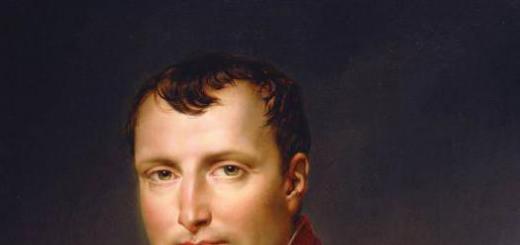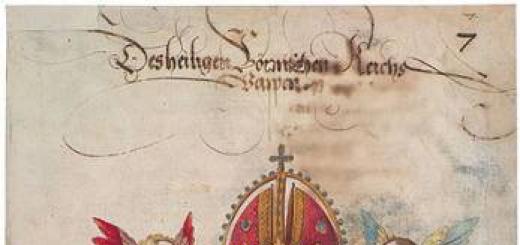Main dates and events: 1796-1801 - reign of Paul I; March 11, 1801 - a palace coup, the assassination of Paul I.
Historical figures: Pavel I; Grand Duke Alexander; P. A. Palen; P. A. Zubov.
Basic terms and concepts: education; absolutism; despotism.
Answer plan:
- 1) the personality of Paul I;
- 2) the main directions of domestic policy: changing the order of succession to the throne, policy towards the peasantry, codification of legislation, policy towards the nobility;
- 3) the main directions of the foreign policy of Paul I;
- 4) palace coup on March 11, 1801: causes and consequences;
- 5) the results and significance of the domestic and foreign policy of Paul I.
Reply material: Paul I began his reign with a change in the order of succession to the throne introduced by Peter I. Now the rights to the throne should not belong to the one appointed by the ruling monarch, but only to representatives of the reigning male dynasty in descending line (sons or brothers in order of precedence). Having removed the associates of Catherine II from power, Paul tried to find his own support in the highest noble circles. In a short time, he appointed 35 new senators and 500 high-ranking officials. The work of the apparatus of higher state bodies has noticeably improved. The number of cases dealt with by the Senate increased from 11,638 in 1796 to 130,000 in 1800. The rules forbidding peasants to complain about their masters were abolished. Now the tsar appointed “reception days” and placed a special box for petitions near the palace, which he opened with his own hand. Corporal punishment of persons over the age of 70 was prohibited. State peasants received per capita allotments of 15 acres and a special class administration. Burdensome for peasants bread filing was replaced by a cash collection. Arrears with a total value of 7 million rubles were removed from the peasants. In the interests of the peasants, Pavel carried out one of the largest transformations - he limited the corvée to three days a week and forbade the peasants to work on weekends and holidays. A ban was introduced on the sale of householders and peasants without land. For the cruel treatment of the peasants, the tsar charged the governors with the duty to arrest the guilty without publicity and escort them to the monastery. At the same time, Pavel was sincerely convinced that the serf had a better life than the "ownerless" (state). This can explain the fact that during the four years of his reign he handed over 600 thousand state peasants to the nobles (whereas his mother handed over 800 thousand peasants during the 34 years of her reign).
Drawing attention to the high cost of food, the emperor ordered it to be sold at reduced prices from state stocks. The price of salt was lowered, and the market prices of food sold in private shops were limited.
Dissolved in 1769, Pavel renamed the Legislative Commission into the Commission for drafting the laws of the Russian Empire. During the short period of his reign, this commission drew up plans for the codification of the laws of the country and summarized local legislative acts.
Another important direction of domestic policy was the restriction of noble rights and privileges. In essence, a series of acts in this direction can be described as a “degraded letter” to the nobility. Instead of "freedom from compulsory service ”Paul ordered to appear in the regiments of all noble children recorded in them. The free transition from military to civilian service was prohibited without special permission from the Senate, approved by the tsar. Instead of "freedom from taxes and duties," the nobles were subject to new taxes on the maintenance of the local administration. “Freedom of noble assemblies” was not only limited (provincial assemblies ceased to exist at all, the number of nobles participating in the elections was reduced by 5 times), but this expression itself was replaced by a “noble set” more acceptable to Paul. The right granted by Catherine to any nobleman to make requests and complaints to the autocrat himself was canceled. Now the nobles could apply to the emperor only after the permission of the governor. The “right of the nobles to personal integrity” was also openly violated (punishment with sticks of nobles - non-commissioned officers, etc. was resumed).
The reign of Paul was also associated with open repressive measures. After accession to the throne, he announced an amnesty, under which N. I. Novikov and A. N. Radishchev fell. However, a new wave of punishments began almost immediately. Decrees aimed at limiting the power of the nobles caused not only discontent, but also hatred towards the emperor. In the highest circles of the guard, forces were gradually formed for a conspiracy to overthrow the "cruel creature".
In foreign policy, Paul at first tried to realize his dream of waging "only defensive" wars and therefore declared neutrality with respect to revolutionary France. At the same time, he remained an implacable opponent of the French revolutionary ideas. Friendly relations were established with Prussia, Denmark, Sweden, which eventually led to the gradual formation of a second anti-French coalition consisting of Russia, England, Austria, and the Kingdom of Naples. The Russian expeditionary force in Italy was headed by the great commander A. V. Suvorov. In a short time (from April to September 1799), he managed to defeat the French troops in Italy and, crossing the Alps through the impregnable passes of Saint Gotthard, go to Switzerland to join the corps of General A. M. Rimsky-Korsakov. For this, Suvorov was awarded the title of Generalissimo of the Russian troops and awarded orders and titles of the powers allied with Russia. At the same time, the squadron under the command of Admiral F.F. Ushakov won a number of victories at sea and liberated the Ionian Islands. Only in Holland the Russian-English corps did not achieve success and was soon returned. But in the end, only the allies of Russia managed to take advantage of the victories over Napoleon. This caused a break with England and Austria. Paul's indignation at the position of England was so great that he went for a gradual rapprochement with France. The ultimate goal of this alliance was to isolate and divide not only the British but also the Ottoman Empire.
The policy of the new emperor, aimed at limiting the privileges of the nobles on the one hand, and measures to somewhat alleviate the position of the peasants, led to the fact that a conspiracy arose against Paul, headed by P.A. Palen, who at that time held the post of military governor of St. Petersburg, the Zubov brothers and others. Indirectly, Paul's son, heir Alexander, also supported the conspirators.
Send your good work in the knowledge base is simple. Use the form below
Students, graduate students, young scientists who use the knowledge base in their studies and work will be very grateful to you.
Posted on http://www.allbest.ru/
Posted on http://www.allbest.ru/
Federal Agency for Education
St. Petersburg State University of Architecture and Civil Engineering
Department of History
Discipline: Domestic history
Domestic and foreign policy of Paul 1
Student of group 13-s-1
Panyukova K.I.
Supervisor:
S.Yu. Kargapol
Saint Petersburg 2014
Introduction
1. Personality of Paul 1
2. Domestic policy
3. Foreign policy
Conclusion
Bibliography
Emperor Paul I is a peculiar, extraordinary, contradictory and mysterious figure on the Russian throne. His identity to this day causes controversy among historians.
All his positive qualities were combined with extreme temper, even eccentricity. Pavel quickly moved from simple-hearted laughter to anger, from noble gestures to insults of others. It was the spontaneity, unpredictability of his behavior that was the most pernicious trait of his character for those around him.
This topic is relevant, since the period of the reign of Paul I raises many questions and contradictions and contains hypotheses that need to be substantiated.
1. Personality of Paul 1
Emperor Paul 1 is one of the most mysterious and tragic figures on the Russian throne. He was born on September 20, 1754 in St. Petersburg, ascended the throne of the Russian State after the death of his mother Catherine 2 on November 7, 1796, reigned 4 years, 4 months and 4 days.
Pavel was born into the family of the heir to the Russian throne, Grand Duke Peter Fedorovich, and Alz-Zerbst Princess Sophia Augusta Frederica, who in 1745 converted to Orthodoxy and received the name Ekaterina Alekseevna. Pavel's childhood was very orphan, although it was spent in the luxury of royal courts. The father was not interested in the life of his son, and Pavel was separated from his mother.
Elizaveta Petrovna was mainly involved in his upbringing, but she had close ideas about how to raise babies. In 1761, after the death of the empress, Peter 3 ascended the throne. Immediately after these events, Catherine's position at court worsened. The husband did not hide his hatred for her and openly lived with his mistress. On June 28, 1762, Catherine, with the help of the guards regiments, carried out a coup d'état, concentrating power in her hands. Peter 3 was placed under house arrest and soon killed by supporters of the new mistress of Russia. E.V. Horvatov "Russian Hamlet. Paul 1, the rejected emperor "- M.: AST-PRESS BOOK 2011 (3 s - 9 s).
On September 20, 1772, Grand Duke Paul turned 18 years old and as a gift he received the right to manage estates in Holstein, but the joy was premature - he could not rule in his tiny state, a year later Catherine transferred him to Denmark. A.N. Bokhanov Hamlet on the Russian Throne. Pavel 1 "- M .: Veche 2013 (11 s -14 s).
On September 29, 1773, in the Kazan Cathedral of St. Petersburg, the marriage of Paul and the nee Princess Augusta-Wilhelmina-Louise of Hesse-Darmstadt took place, who died two and a half years later in childbirth. In the same year, Paul was chosen a new wife - Sophia Dorothea of Württemberg, who, after converting to Orthodoxy, became known as Maria Feodorovna.
After some time, Pavel Petrovich and Maria Fedorovna have their firstborn, Alexander, and after some time, Konstantin. She sends Pavel and Maria Feodorovna on a long journey through Europe. Upon Paul's return from his trip, he is denied access to power. Relations between him and his mother finally deteriorate. Catherine fears that Paul might conspire to dethrone her. Pavel, in turn, is afraid that Catherine may try to deal with him by force. In order to feel more comfortable, Ekaterina Alekseevna grants her son a Gatchina estate, 40 kilometers from St. Petersburg, so as not to see him at court.
Pavel Petrovich will live in Gatchina for 13 years. He is still not allowed to participate in state affairs, the only thing he is allowed to do is to lead a small Gatchina army. Like Peter I, who created amusing regiments from ordinary peasants, Pavel forms a small Gatchina army, "my Holsteiners" - that's how proudly he calls them. Establishes order and discipline in everything. Paul I, like Peter III, sympathizes with the Prussian military system. G.L. Obolensky "Emperor Pavel 1" - M .: LLC "TID" "Russian Word - RS" 2001 (139 p.-140 p.).
On November 6, 1796, Catherine, who turned the Russian Empire into a superpower that all European states reckoned with, died. The Empress did not want to give the throne to her son to the last and, according to historians, she was going to write a will for her grandson Alexander I. Only sudden death prevented her from doing this. Despite all the obstacles of her mother, who for so long did not allow Paul to power and, moreover, intended to deprive him of the opportunity to rule after her death. But, despite this, Paul I becomes at the helm of the Russian Empire. A.N. Bokhanov Hamlet on the Russian Throne. Pavel 1 "- M .: Veche 2013 (29 p.-31 p.).
2. Domestic policy
Paul began his reign by changing all the orders established by Catherine.
During his coronation, Paul announced a number of decrees, for example, Paul established a clear system of succession to the throne. From that moment on, the throne could be inherited only through the male line, after the death of the emperor, he passed to the eldest son or the next brother in seniority, if there were no children. A woman could take the throne only when the male line was suppressed. By this decree, Paul excluded palace coups, when emperors were overthrown and erected by the power of the guard, the reason for which was the lack of a clear system of succession to the throne (which, however, did not prevent the palace coup on March 12, 1801, during which he himself was killed). Also, in accordance with this decree, a woman could not occupy the Russian throne, which excluded the possibility of the appearance of temporary workers (who accompanied the empresses in the 18th century) or a repetition of a situation similar to the one when Catherine II did not transfer the throne to Paul after he came of age.
The domestic policy of Paul 1 continued by softening the conditions for the life of the peasants. First of all, the emperor repealed the law that forbade the peasants to complain about the landowners. After that, all types of corporal punishment for peasants were canceled, all arrears from peasants were canceled, the amount of which at the time Paul 1 came to power exceeded 7 million rubles.
A manifesto on the three-day corvee was also established, in which Paul forbade the landlords to send corvee on Sundays, holidays, and more than three days a week (the decree was almost never executed locally). A.N. Bokhanov Hamlet on the Russian Throne. Pavel 1 "- M.: Veche 2013 (125 p.-143 p.).
Fearing the spread of the ideas of the French Revolution in Russia, Paul I forbade young people to go abroad to study, the import of books, including notes, was completely banned, and private printing houses were closed. The regulation of life reached the point that a time was set when it was supposed to put out fires in houses by special decrees.
Significantly narrowed the rights of the nobility in comparison with those that were granted by Catherine II, and the procedures established in Gatchina were transferred to the entire Russian army.
As for the army, Paul carried out a whole military reform:
One of his first decrees, Paul approved new military regulations, then revised the Peter's naval regulations, limited the service life of recruits to 25 years. The functional uniform introduced under Potemkin was replaced by the then archaic uniform of the army of Frederick the Great, whom Paul (like his father) considered his idol. But in the new form there was one useful innovation - overcoats, which replaced the previous epanchi in 1797 and saved many Russian soldiers in the war of 1812. Outside of St. Petersburg, the construction of barracks was launched. Fundamentally new units appeared in the army - engineering, courier, cartographic.
Huge influence was given to the external side of military affairs. For the slightest blunders, officers were expected to be demoted, which created a nervous atmosphere among the officers. Under the ban were political circles among the officers. At the same time, the soldiers were allowed to complain about the abuses of the commanders and were not punished as often as before. For the first time in Europe, award badges for privates were introduced. G.L. Obolensky "Emperor Pavel 1" - M .: TID LLC "Russian Word - RS" 2001 (165 pp.-170 pp.).
The new emperor tried to instill fear and respect for his person in everyone. As a result, mass repressions began in the country. At the same time, the emperor did not look at the title or origin of the accused. Paul 1 was not interested in the violation, sometimes exile and deprivation of all ranks and privileges were subjected to nobles who simply violated the uniform. Paul 1 liked to repeat that there are practically no noble persons in his country, and those with whom the emperor deigns to speak are considered noble, and exactly as long as the emperor speaks with him. The internal policy of Paul 1 was extremely cruel for the country's elite.
3. Foreign policy
In conducting foreign policy, Paul, unlike Catherine, was guided not by the interests of the state, but by his own.
One of the most important directions of Russian foreign policy at the end of the eighteenth century was relations with France.
Paul I at the beginning of his reign entered into negotiations with France. However, there were serious contradictions between Russia and France in Germany, the Middle East, and the Polish question. The expedition of the French army under the command of Bonaparte to Egypt, his capture of Malta and the Ionian Islands ran counter to the interests of Russia's eastern policy. Russia joined the second coalition. At the beginning of 1799, an alliance was concluded between Russia and Turkey, according to which the Russian navy received the right to free passage through the straits. The Russian-Turkish fleet under the command of F.F. Ushakov liberated the Ionian Islands from the French. Ushakov contributed to the fact that a progressive constitution for that time was introduced on the Ionian Islands. According to the Russian-Turkish convention of 1800, the “Republic of the Seven United Islands” was created, which was under the double protectorate of Russia and Turkey (formally, the Turkish Sultan was its overlord).
In the future, the Ionian Republic played a big role in the development of the Greek national liberation movement.
Major operations unfolded in Italy, where Suvorov's army inflicted a series of crushing defeats on the French. The military art of the brilliant commander Suvorov prevailed over the skill of his opponents. However, the actions of the second coalition were reactionary in nature, its troops restored the old feudal order in Italy.
The second coalition was short-lived. Great dissatisfaction in Russia was caused by the treacherous policy of Austria, which put the Russian troops in Italy in a difficult position. By this time, Russian-English contradictions in the Middle East and the Mediterranean basin had also become aggravated. The British tried to undermine the predominance of Russia in Turkey, to oust Russia from the Ionian Islands. Having mastered Malta, they did not want to let it out of their hands. Meanwhile, Paul himself intended to make Malta a Russian stronghold in the Mediterranean.
Paul I not only withdrew Russian troops, but in 1800 broke off relations with England, sequestered English goods and ships in Russia, and concluded treaties with Sweden, Denmark and Prussia directed against England, resuming the rules of armed neutrality. At the same time, he began negotiations with France on peace, an alliance against England and a joint campaign in India. England and Russia were at war. The English fleet under the command of Nelson defeated Russia's ally Denmark and moved to Kronstadt and Revel.
Paul's anti-English policy was extremely unpopular in noble circles: England was the most important market for goods exported by Russian landowners. Rapprochement with France was also condemned by many nobles. Therefore, foreign policy measures intensified the growing discontent among the nobles and served as an impetus for organizing a palace conspiracy. It was attended by prominent dignitaries and the capital's officers; the heir to the throne, Alexander Pavlovich, knew about the plot, and Ch. Whitworth, the English ambassador to St. Petersburg, exiled by Paul I from Russia, also had connections with the conspirators. E.V. Horvatov "Russian Hamlet. Paul 1, the rejected emperor "- M.: AST-PRESS BOOK 2011 (138 p.-184 p.).
Pavel was killed in the Mikhailovsky Palace on the night of March 12, 1801. Alexander I (1801-1825) became his successor.
Conclusion
The reign of Paul 1 was 4 years 4 months and 4 days - too little to leave a lasting and unambiguous mark on history. Nevertheless, Paul's foreign and domestic policy was controversial. The reason for this inconsistency, most likely, was the desire to do everything in defiance of the mother, but this can hardly explain such changes as the reform of the army or the abolition of the privileges of the nobles.
He had rather good beginnings, perhaps he would have managed to accomplish something if not for such an early end to his life.
Bibliography
emperor paul reign
1. A.N. Bokhanov Hamlet on the Russian Throne. Pavel 1 "- M .: Veche 2013
2. E.V. Horvatov "Russian Hamlet. Paul 1, the rejected emperor "- M .: AST-PRESS BOOK 2011
3. G.L. Obolensky "Emperor Pavel 1" - M .: LLC "TID" "Russian Word - RS" 2001
Hosted on Allbest.ru
...Similar Documents
The tragic figure of Paul I on the Russian throne. Restoration of the system of colleges. Domestic policy and reform in the army. Cancellation of the Petrine decree on the appointment by the emperor himself of his successor on the throne and the establishment of a clear system of succession to the throne.
presentation, added 10/23/2013
Foreign policy of Paul I. Military reform. Domestic policy. The economic situation of Russia by 1796. Peasant reforms of Paul I. Trading activity under Paul I. Development of industry. financial policy.
abstract, added 11/13/2002
The study of the biographical data of Emperor Paul I - a peculiar and tragic figure on the Russian throne. The coronation of the emperor, the features of his domestic policy - transformations in the socio-economic and church sphere. Pavel I and Catherine.
abstract, added 01/09/2011
The foreign policy of the reign of Paul 1 in 1800-early 1801. Suvorov - commander-in-chief of the Russian-Austrian army. Northern Italy is a complex theater of operations. Crossing the Alps and the battles of the commander. Contradictions between Russia and England.
lecture, added 12/19/2009
Biography, upbringing and character of Paul I. Oddities of the reign and statesmanship of Paul. Emperor Paul I and the Order of Malta. Paul I through the eyes of historians of his era. Rapprochement of France and Russia. Conspiracy against Paul. V. Suvorov and opposition to Paul.
abstract, added 05/12/2011
Reforms of Paul I. Political program. Counter-reforms, decrees. Foreign policy. Peacefulness of Paul. The desire to make life easier for peasants by abolishing recruitment. The development of industry on a feudal basis. Contradictory peasant policy.
abstract, added 11/30/2006
Biography of Paul I - son of Peter III and Catherine II. He was brought up under the tutelage of Elizabeth Petrovna. Childhood passed in an atmosphere of intrigue. Paul's education. Death from childbirth of first wife. Second marriage. Ascension to the throne. Paul's domestic policy.
presentation, added 03/15/2011
Erroneous conclusions about the inconsistency and inconsistency of the foreign and domestic policies of Paul I. Analysis of the policy towards European states and revolutionary France. Italian and Swiss campaign. Patronage over the Order of Malta.
abstract, added 12/12/2009
The historical conditions in which the activities of Emperor Paul I took place. The tasks that this historical figure set himself, the influence of his personal qualities on the implementation of tasks. The results of the reign of Paul I, its role and significance in the history of Russia.
test, added 10/05/2014
The relationship of Paul I with his parents and the role of the experience gained in the management of the Gatchina army. Features of the political views of Pavel Petrovich and their reflection in the "Instruction on the management of the state". The essence of the political program of Paul I as emperor.
Questions and tasks for working with the text of the paragraph
1. How was the personality of Pavel Petrovich formed? What views did he hold?
The views of the Grand Duke on the administration of the state were formed, on the one hand, under the influence of the French enlighteners, on the other, teachers and educators. Justice, love of order, and moderation characteristic of Pavel Petrovich were also reflected in his political preferences.
Pavel's mentors, the Panin brothers, were pro-Prussian, their sympathies could not leave the Tsarevich indifferent. In addition, in 1770, the brother of Frederick the Great, Prince Heinrich, visited St. Petersburg. Young Pavel became close to him “and from that time on, love for Prussia was established in the young Grand Duke, which, like his parent, he never changed,” wrote D. F. Kobeko. A visit to Berlin in 1776, when Paul was able to get up close and personal with the Prussian state system based on order, regulation and discipline, only strengthened his confidence in the benefits of such a system for Russia.
The Grand Duke was impressed by the views of Peter I - the idea of serving the state of all subjects, regardless of class, for the sake of achieving the common good. Being committed to order and justice, Pavel Petrovich was convinced of the need for laws, which must be strictly followed.
2. Why did Catherine II react negatively and even hostilely to her son's proposals, set out in notes addressed to her?
In 1774, the Tsarevich submitted to Catherine II a draft “Discourse on the State in General”. It proposed to abandon offensive wars, and prepare only for defense, for which three armies should be deployed in the north, west and south of the empire, and the fourth in Siberia. Recruitment kits were supposed to be gradually abolished, recruiting soldiers' children into the army instead. All army life must be strictly regulated, everyone from the commander to the private must obey iron discipline. Soldiers in this state of affairs "will not suffer and see themselves subject to the whims and frenzy of private commanders." "Discourse" did not explicitly criticize the military policy of the empress.
3. What features can be identified in the domestic policy of Paul I? What do you think caused them?
Emperor Paul I ascended the throne on November 6 (17), 1796 at the age of 42. On April 5 (16), 1797, on the first day of Easter, the coronation of the new emperor took place. This was the first joint coronation of an emperor and an empress in the history of the Russian Empire. After accession to the throne, Paul resolutely set about breaking the rules established by his mother. Contemporaries were left with the impression that many decisions were made in spite of her memory. Deeply disgusted with revolutionary ideas, Pavel, for example, returned freedom to the radicals Radishchev, Novikov and Kosciuszko, and even allowed the latter to leave for America.
4. Was Paul I violated the order of succession to the throne established by Peter I? Prove your conclusions with quotes from the text.
On the day of the coronation, Paul I publicly read the adopted new law on succession to the throne, drew a line under the century of palace coups and women's rule in Russia. From now on, women were actually removed from the inheritance of the Russian throne, because there was a strict requirement for the transfer of the crown through the male line (from father to son).
The Act of Pavlovsk included several fundamental differences from the decree on Peter's succession to the throne. In contrast to the Petrine decree, which provided for the sovereign the right to appoint an heir to himself (and thereby opened the way to the era of palace coups), the act introduced inheritance by law, “so that the state would not be without heirs, so that the heir would always be appointed by law himself, so as not to there was not the slightest doubt about who should inherit, in order to preserve the right of childbirth in the inheritance, without violating the right of nature, and to avoid difficulties in passing from generation to generation.
Unlike the Petrine decree, which did not provide for differences in the rights for male and female heirs, the act introduced the so-called "Austrian", "semi-Salic" primogeniture, in which male descendants had an advantage in inheritance; as a result, after the adoption of the act, there was no more woman on the Russian throne.
The act for the first time in the Russian Empire introduced the concept of regency. For monarchs and their heirs, the age of majority was 16, and for other members of the imperial family - 20 years of age. Petrovsky decree did not provide for the possibility of guardianship of the sovereign.
The Act of Pavlovsk forbade the occupation of the Russian throne by a person who did not belong to the Orthodox Church.
5. What percentage of the generals (approximately) were punished during the reign of Paul I?
333 out of 500 generals is 67%.
6. Did the position of the peasants improve or worsen during the reign of Paul I? What categories of peasants were affected by the changes? Justify your answer with quotes from the text.
With a manifesto on the three-day corvee, Paul forbade the landlords to send corvee on Sundays, holidays, and more than three days a week. The grain service, which was ruinous for the peasants, was abolished and the arrears of the poll tax were forgiven. Preferential sales of salt began. They began to sell bread from state stocks in order to bring down high prices. This measure led to a noticeable drop in the price of bread. It was forbidden to sell yard people and peasants without land, to separate families during the sale. In the provinces, the governors were ordered to observe the attitude of the landowners towards the peasants. In the case of ill-treatment of serfs, the governors were ordered to report this to the emperor.
By a decree of September 19 (30), 1797, the duty to keep horses for the army and provide food was abolished for peasants, instead they began to take "15 kopecks per soul, an allowance for the head salary." At the beginning of his reign in 1797, he allowed the peasants to file complaints against the oppression of landowners and administrators. But soon a decree was issued ordering the serfs, under pain of punishment, to obey their landlords. The decree of October 21 (November 1), 1797, confirmed the right of state-owned peasants to enroll in the merchant class and philistinism.
7. What privileges did the nobility lose under Paul I?
On January 2 (13), 1797, Paul canceled the article of the Letter of Complaint, which forbade the use of corporal punishment against the nobility. Corporal punishment was introduced for murder, robbery, drunkenness, debauchery, and official violations.
On April 24 (May 5), 1797, Paul I deprived the nobility of the right to submit collective complaints to the sovereign, the Senate and regional governors.
In 1798, Paul I forbade nobles who had served as officers for less than a year to ask for their resignation.
By decree of December 18 (29), 1797, the nobles were obliged to pay tax for the maintenance of local governments in the provinces. In 1799 the amount of the tax was increased.
In 1799, the nobles began to pay a tax of 20 rubles "from the soul."
By decree of November 15 (26), 1797, the Emperor forbade the participation in elections of nobles dismissed from service for misconduct. The number of voters was reduced, and the governors were given the right to interfere in elections.
In 1799, provincial noble assemblies were abolished.
On August 23 (September 4), 1800, the right of noble societies to elect assessors to the judiciary was abolished.
Nobles evading civil and military service, Paul I ordered to be brought to trial. The emperor sharply limited the transition from military to civilian service.
Paul limited noble deputations and the ability to file complaints. This was possible only with the permission of the governor.
We study documents
From the memoirs of a contemporary of Paul I
During the most reverent reign of Emperor Paul, in the vicinity of the capital, the peasants worked for the master not for three days, as the king deigned to order, but for a whole week; It's hard for a peasant to compete with a master.
1. Why do you think the emperor’s decree “on a three-day corvee” was not carried out?
The process of implementing the Manifesto did not achieve its goals and ended in an almost complete failure due to a number of objective reasons, the key of which are: the ambiguous and contradictory version of this law (it created opportunities for various interpretations of its content); lack of effective mechanisms for monitoring the implementation process; boycott of the norms of the Manifesto by noble and landlord circles; the lack of effective "feedback" between the serfs and the authorities (most of the peasant petitions had no prospects); the indecision of the autocracy (the Romanovs were afraid to violate the privileges of the nobility, fearing the collapse of their own power).
From the notes of the approximate Paul I, Count F.V. Rastopchina
Not without a feeling of sorrow and disgust, they follow the way of life of the sovereign here, as if he is making every effort to arouse hatred for himself.
1. What actions of Paul I caused the appearance of this record?
One of his first decrees, Paul approved new military regulations, then revised the Peter's naval regulations, limited the service life of recruits to 25 years. Instead of a rational "Potemkin" military uniform, which abolished wigs and curls, Pavel introduced uniforms for the troops, completely borrowed from Prussian models. Great attention was paid to the external side of military affairs (drill and frunt). For the slightest blunders, officers were expected to be demoted, which created a nervous atmosphere among the officers. Under the ban were political circles among the officers.
Thinking, comparing, reflecting

3. Using the Internet, collect excerpts from the memories of Paul I, confirming the version that he was not called a romantic for nothing.
Count F. Golovkin: "Let's say ... - that in this whole story there could be a great and beautiful idea, namely: for the sovereign to become the head of the entire nobility of Europe - in an era when the oldest and most useful institutions collapsed."
Solms, the German ambassador: “The Tsarevich is very handsome in face, his conversation and manners are pleasant, he is meek, extremely courteous, helpful, cheerful disposition. Under this beautiful shell hides a most excellent, honest and sublime soul, and at the same time the most pure and innocent, which knows evil only from the most repulsive side and in general knows about evil only as much as is necessary in order to arm itself with the determination to avoid it itself. and disapprove. In a word, it is impossible to say enough to him in praise” (1773).
Educator Pavel Poroshin: “It is much easier to please E.V. than to forever observe mediocre, not only great and ardent from him, friendship and mercy. He tended to treat people he met for the first time with prejudice, influenced by the reviews he had heard about them before. His fantasy was too great.
Adam Czartoryski said that Paul "in the depths of his soul sought truth and justice, and often in his angry outbursts punished fairly and truly."
4. Can the reign of Paul I be called the era of general lack of rights (V.O. Klyuchevsky)? Explain your opinion.
I agree with the opinion of V.O. Klyuchevsky. Under Paul 1, there was an increase in bureaucracy, military discipline was tightened, the right of nobles to personal immunity was openly violated.
5. Using the Internet, collect excerpts from the memoirs of contemporaries about Paul I, confirming the inconsistency of his nature. Why do you think he was dethroned?
Princess Lieven: “The Emperor “corrected his guilt and injustice with great sincerity.”
Count Kotzebue: “Paul readily acknowledged his own injustice. His pride then humbled "
P.P. Lopukhin: “The emperor noticed some kind of malfunction in the uniform of one officer and hit him with a cane for this. The next day, the emperor called this officer to him, apologized to him and gave him a generous reward.
The complex and contradictory reign of Paul I (1796-1801) gave rise to very diverse assessments of the tsar's personality both among contemporaries and historians: unenlightened absolutism, military-political dictatorship, Russian Hamlet, romantic emperor. Most of the opinions are negative, but modern historians are making attempts to more thoroughly analyze the policy of Paul I.
Elizaveta Petrovna took away the long-awaited heir from her parents, intending to raise him herself, and then declare Paul the heir to the throne instead of Peter III. In 1761, a supporter of the ideas of the Enlightenment, N.I. Panin, who dreamed of making the boy an ideal sovereign for Russia, was appointed Pavel's tutor in 1761. The young man grew up with the realization of his high destiny and faith in the ideals of enlightened absolutism. After the palace coup of 1762 and the coming to power of Catherine II, Paul was removed to Gatchina, where he lived in his own courtyard and did not take part in public affairs.
During this period, the Prussian king Frederick II became the idol of Paul. The Grand Duke turned Gatchina into a small Prussian town, created his own army there, in which he introduced Prussian regulations, uniforms and monstrous drill. Catherine II was not going to cede the throne to her son and even simply involve him in public affairs. There is evidence that she made a will, under the terms of which the eldest son of Pavel Alexander became the heir. But the secret testament of Catherine II was apparently destroyed after her death, and in November 1796 Paul I became emperor.
Paul I had an unbalanced, quick-tempered character, many of his actions were unpredictable, and decrees and reforms were ill-conceived and contradictory. With the accession of Paul I to the throne, a reorientation of domestic policy began with a defiant rejection of Catherine's principles and traditions. Companions and favorites of Catherine II were dismissed, and A. N. Radishchev, N. I. Novikov and T. Kosciuszko were declared an amnesty. One of the main tasks of domestic policy was to strengthen the centralization of state administration, which led to the adoption of a number of laws:
- in April 1797, an act of succession to the throne was adopted, which canceled the Peter's decree and returned the old order of transferring power strictly but to the male line (valid until 1917);
- the previously liquidated Berg-, Manufaktura- and Commerce Collegiums were restored;
- an department of appanages was created, which managed the estates of the imperial family;
- elements of self-government in provinces and cities (orders of public charity, deanery councils, city dumas) were eliminated.
Paul I proclaimed that he was returning to the laws and orders of Peter I, which led to a change in the estate policy and the restriction of the estate privileges of the nobility. In 1797, a number of provisions of the Charter to the nobility were canceled: a nobleman could leave the service only with the permission of the Senate, approved by the king, corporal punishment for criminal offenses was introduced, the nobles were forbidden to file collective complaints to the emperor, and local noble self-government was placed under the control of the governor. It is not surprising that such measures aroused great dissatisfaction not only with the capital, but also with the local nobility.
Dissatisfaction with the policy of Paul I and its rejection were significantly intensified by reforms in the army, such as the introduction of Prussian military uniforms and regulations, the dismissal of many honored officers, and the introduction of the most severe cane discipline. On the other hand, such measures as the exclusion from the lists of regiments formally registered in the service (including young children), the renewal of the officer corps, the improvement of the maintenance of soldiers, undoubtedly increased the combat effectiveness of the Russian army.
The policy on the peasant question was inconsistent and contradictory. On the one hand, Paul I continued the mass distribution of state lands with peasants as gifts. On the other hand, the serfs were ordered to swear allegiance to the enthroned tsar along with other estates, it was forbidden to sell courtyards and serfs without land. In April 1797, a manifesto appeared on a three-day corvee and compulsory Sunday rest for the peasants, but it was advisory in nature.
In an effort to prevent the penetration of revolutionary ideas into Russia, Paul I forbade free travel abroad, all private printing houses were closed, severe censorship was introduced, up to a ban on the use of such words as “citizen”, “republic”, “nation”, “patriot” and others
The foreign policy of Paul I was also very controversial. At the beginning of his reign, he declared neutrality towards revolutionary France. However, when in 1798 Napoleon captured the island of Malta and landed in Egypt, the situation changed: Turkey declared war on France and turned to Russia for help. Paul I decided to participate in the fight against France and joined the anti-French coalition, which included England, Austria, the Kingdom of Naples and Turkey.
The Russian fleet under the command of Admiral F.F. Ushakov was sent to the Mediterranean to drive the French out of the Ionian Islands. This task was brilliantly accomplished, and the capture of the fortress on the island of Corfu went down in history as one of the most famous naval battles. On the Ionian Islands, the Republic of the Seven United Islands was created under the protectorate of Russia.
The Italian (April - August 1799) and Swiss (September - October 1799) campaigns of A.V. Suvorov showed the strength and power of the Russian army, led to the liberation of Northern Italy from the French, and also revealed the incompetence of the Austrian troops and the treacherous policy of the Austrian government. By order from Vienna, the Austrian troops actually abandoned their Russian allies, which forced A. V. Suvorov to make the legendary crossing of the Alps in the hope of saving the corps of A. M. Rimsky-Korsakov from encirclement.
Paul I was extremely dissatisfied with the actions of Austria and England and went for rapprochement with France, especially since Napoleon's diplomats made considerable efforts to this end. In 1800, Russian-French relations were restored and a peace treaty was concluded. Napoleon invited Paul I to divide the spheres of influence in Europe: France received freedom of action in Western Europe, Russia - in the Balkans. Then Napoleon proposed to weaken the position of England, depriving her of the main colonial source of income - India. Paul I agreed with this plan. As a result, the Cossack regiments were sent to conquer British India. This led to the rupture of Russian-English relations and the cessation of trade with England, which at that time was Russia's main trading partner.
Under Paul I, the development of the North American territories of Russia begins. Permanent Russian settlements were established in Alaska. In 1799, the Russian-American Company was established, the largest economic organization in Russia, engaged in colonial trade.
The unpredictability and inconsistency of the policy of Paul I, the uncertainty and fear of the highest dignitaries and the tsar's inner circle for their future led to the formation of a political conspiracy. It was organized by the governor-general of St. Petersburg, Count P. A. Palen, Admiral I. Ribas, brothers V. A. and P. A. Zubov, generals P. A. Talyzin, L. L. Bennigsen, and others. Alexander, heir to the throne, was also informed. On the night of March 11-12, 1801, the conspirators entered the residence of Paul I, Mikhailovsky Castle, and killed the emperor. This palace coup was the last in the history of Russia. March 12, 1801 A manifesto was published on the death of Paul I and the accession to the throne of his eldest son Alexander I.
Paul 1 took the throne after the death of Catherine 2. His personality remained ambivalent and incomprehensible, some considered him a genius of the Enlightenment, others considered him crazy. The domestic and foreign policy of Paul 1 also causes conflicting assessments.
Childhood of Paul 1
Pavel 1 was born on September 20, 1754, he was also Peter 3. The future emperor studied sciences from childhood, teachers believed that the boy had a lively mind and was gifted by nature.
Pavel loved his father, Pyotr Fedorovich, very much, and considered his mother to be the culprit in his death. He took the loss of his father very hard.
Marriages of Paul 1 and life in Gatchina
Catherine 2 married her son when he was 17 years old to Princess Wilhelmina of Hesse, after baptism - Natalya Alekseevna. She died during childbirth.
And in 1776 Paul married again. The wife was Dorothea of Württemberg, called after baptism Marya Fedorovna. She was a relative of the Prussian king and there is an opinion that it was under her influence that Paul began to like German traditions.
Relations between Catherine II and her son did not go well. The Empress presented the spouses with Gatchina after the wedding, which, in fact, meant the exile of the heir. Here, Pavel Petrovich has an army consisting of half a company of sailors, a cuirassier regiment and an infantry battalion. The future king often organizes reviews and exercises.
In 1777, Paul 1's son Alexander was born, who was immediately excommunicated from his family and given to be raised by those appointed by Catherine 2. Parents were allowed to visit their son only on special days. All attempts by Paul to participate in the political life of the country were immediately suppressed by the empress.

Paul 1 ascended the throne at the age of 42. Having no special skills in government, he nevertheless was an outstanding bright personality. Below you can find out what was the internal and external policy of Paul 1. Briefly, the table shows the main points.
The first thing that Pavel did after the coronation was to rebury his father's ashes in the Peter and Paul Cathedral.
Why was Catherine's policy not continued?
The domestic and foreign policy of Paul 1 was strikingly different from Catherine's. This is largely due to the difficult personal relationship between mother and son.
The emperor was never able to forgive his mother for a conspiracy against his father, which resulted in the death of Peter 3 and the ascension to the throne of Catherine. rumors that Pavel is the child of Saltykov, and not Peter, and therefore he is not from the Romanov dynasty.
Therefore, domestic and foreign policy not only differed from the course of his mother, but broke and remade it. Often he acted in defiance of Catherine.
Internal Politics of Paul 1

The domestic and foreign policy of Paul 1 can be briefly described as a systematic change and destruction of all the innovations of Catherine 2.
Military and peasant reforms
They are considered the largest changes in the state. Paul 1 changed the regulations of the infantry, sailors and cavalry. Under the new laws, officers were responsible for the health and life of soldiers. They were required to provide annual leave, the officers did not have the right to use them to work on their estates. The soldiers were reduced to 25 years of service, at the end of which a pension was awarded. Pavel 1 formed a new army unit: a courier corps, a pioneer regiment, etc.

The domestic and foreign policies of Paul 1 largely affected the Russian people. So, the position of the peasants improved, but some of the actions of the emperor in history are considered strange. For example, Pavel distributed many state serfs to landowners, believing that they would be better off there.
The duties of the peasants changed greatly: the landlords could demand that they work off the corvée no more than three times a week, the grain duty was abolished.
Position of the nobility
Paul 1 deliberately weakened the nobility. Apparently, the emperor was afraid. He allowed the nobles to be punished corporally for robbery, drunkenness, murder, and official violations.
Pavel abolished meetings of the nobility, introduced a poll tax, banned collective petitions and participation in elections for those dismissed from public service for misconduct.
Such was the direction of the domestic and foreign policy of Paul 1. The table, which briefly lists the main external changes in the country, is presented below.
Major developments in domestic policy |
|
| 1796 | Prussian orders are introduced in the army. Censorship is intensifying, foreign books are banned. |
| 1797 | The succession law is passed. There is a ban on leaving and studying abroad. The favorites of Catherine 2 fall into the link. |
| 1798 | Industrial enterprises are allowed to buy peasants. |
Restriction of the nobility |
|
| 1798 | The governors undertake to be present when the selection of the leader of the nobility takes place. |
| 1799 | Provincial meetings are cancelled. It is forbidden for district leaders to elect provincial leaders. The ban on collective petitions. |
Reforms related to peasants |
|
| 1796 | Peasants are attached to the land in Novorossiya. |
| 1797 | Corvee is limited to three days. It is forbidden to sell landless peasants and yard people by auction. |
| 1798 | It is forbidden to sell Ukrainian peasants without land. |
The results of the domestic policy of Paul 1
The emperor's attempts to document all the rules of life for the subjects, drill the army and oppress the nobility led to the logical death of Paul 1 at the hands of the conspirators. It is documented that the news of the death of the sovereign was greeted with rejoicing.

Descendants and successors assessed his reign negatively, considering Paul a petty tyrant and a tyrant. The domestic and foreign policies of Paul 1 were also sharply condemned.
Foreign policy
The domestic and foreign policy of Paul 1, in short, was originally aimed at fighting France. In 1798, A. V. Suvorov, the commander of the army, was even organized; thanks to his talents, Northern Italy was liberated and the troops crossed the Alps. But in 1799 the agreement was terminated, and the army was withdrawn from Europe.
The alliance with England did not end too well - Paul blamed her for the failure of the joint expedition to the Netherlands.
Impulsive and emotional was the domestic and foreign policy of Paul 1. The table illustrates the main events of foreign policy.
Foreign policy of Paul 1 |
|
| 1798 | Creation of an anti-French coalition: Russia, Austria, England, Naples |
| 1798 | The Black Sea squadron of F. Ushakov wins in the Mediterranean - the French fortress of Corfu is recaptured. |
| 1799 | Campaign of A. V. Suvorov. Northern Italy liberated from the French. |
| 1800 | The country's foreign policy is changing - an alliance with France becomes a priority. |
| Consequences of an alliance with France | Russia withdraws from the war and breaks off diplomatic relations with England and Austria. |
| The Russian army begins to prepare for a campaign against India. | |
Peace has been concluded with France. Russia takes part in alliances against Austria and England. |
|

Thus, the domestic and foreign policy of Paul 1 is well outlined. The scheme helps to concisely state the most basic, fateful decisions both for the country and for the emperor.
Results of foreign policy
The actions of the emperor in relation to England are considered rash. Pavel 1 is negatively evaluated. Its summary can be conveyed in one word - short-sightedness. This is due to the almost started war with this power because of the interests of the Knights of Malta. Many note the unjustified risk of Asian campaigns.










